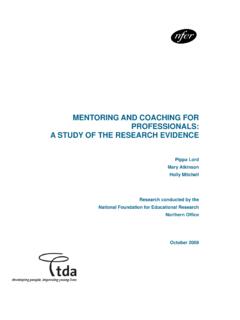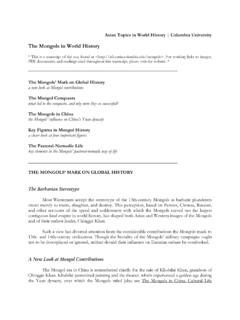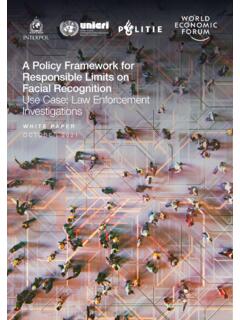Transcription of Paper: School starting age: European policy and recent ...
1 School starting Age: European policy and recent Research Caroline Sharp paper presented at the LGA Seminar When Should Our Children Start School ? , LGA Conference Centre, Smith Square, London, 1 November 2002 1. Introduction Age of starting School and the early years curriculum have been the subject of considerable debate in recent years. Many kinds of influences are apparent in this debate, as we move into a period of increased funding but also increased demand and accountability. Some of the recent developments in pre- School policy include an increasing admission of four-year-olds to reception classes, the introduction of Desirable Learning Outcomes for three and four-year-olds (SCAA, 1997), the introduction of statutory baseline assessment (QCA, 1998) and, most recently, the development of the Foundation Stage, encompassing children aged from three to the end of the reception year (QCA, 2000).
2 For many years, the UK has been out of step with other countries in expecting children to start School at an early age. Those in favour of keeping the current situation argue that young children are capable of learning the more formal skills inherent in the School curriculum and that starting School early enables children to get a head start in learning. In addition, it is argued that an early start provides an opportunity for children from less advantaged backgrounds to make up the deficit in their academic skills (this is one of the most frequently-cited arguments for starting 1schooling early). Early School starting age is also thought to be popular among parents (a survey of parents who moved their children from pre- School playgroups to School at four found that most were happy with their decision, see Blake and Finch, 2000).
3 On the other hand, concerns have been raised about the appropriateness of a School environment for young children. Does teaching the 3Rs early result in any long-term advantage and is there a danger that young children will miss out on other important experiences or even be damaged by an early start? The purpose of this paper is to provide an up-to-date picture of School starting ages in Europe and to consider the research evidence that may throw some light on these important issues. 2. Age of starting School in Europe In most of Europe, children begin compulsory schooling when they are six years old. Table 1 shows the School starting ages in 33 European countries. The countries included in the table are members of one of three groups: the European Union; the European Free trade Association/the European Economic Area; and the so-called pre-accession countries (countries that are preparing for entry to the European Union in 2004).
4 Table 1 Compulsory age of starting School in European countries, 2002 Four Northern Ireland Five England, Malta, Netherlands, Scotland, Wales Six Austria, Belgium, Cyprus, Czech Republic, France, Germany, Greece, Hungary, Iceland, Republic of Ireland, Italy, Liechtenstein, Lithuania, Luxembourg, Norway, Portugal, Slovakia, Slovenia, Spain Seven Bulgaria, Estonia, Denmark, Finland, Latvia, Poland, Romania, Sweden Source: European Commission. EURYDICE and EUROSTAT (forthcoming) Figure D1. 2 The Table shows that over half of the 33 European countries listed have six as the official School starting age. The latest School starting age is seven (in three Scandinavian countries and five Eastern European countries). Three UK countries (England, Wales and Scotland) as well as Malta and the Netherlands, start School at five.
5 Northern Ireland, with a starting age of four, has the earliest compulsory School starting age in Europe. Of course, compulsory School age only tells part of the story. Many countries have pre- School systems which the majority of children attend. Several countries allow individual children to enter School before compulsory School age or to delay entry, in accordance with parents wishes, teachers views and/or the results of pre- School assessments. In several cases, compulsory School age represents the maximum age by which children start School and the majority of children are in School before compulsory School age. In line with Europe, most countries in the world favour a School starting age of six (Ball, 1994; Bertram and Pascal, 2002; O Donnell et al., 2002; Woodhead, 1989; West and Varlaam, 1990). So the UK countries compulsory School starting age of five is low by world standards.
6 In practice, our actual School starting age is earlier still. The official School starting age in England and Wales is the term after a child s fifth birthday. But most English and Welsh children start School when they are four, because many schools admit children to reception class at the beginning of the year in which they become five. The latest figures from the DfES (DfES, 2002) show that in January 2002, 99 per cent of the English four-year-old population were attending some kind of educational provision, with 59 per cent of four-year-olds in infant classes. Because this calculation is based on a census in January (in relation to the population of children born in the calendar year from January to December, rather than in relation to those born during the academic year from September to August) it is likely that it represents a considerable underestimate of the proportion of English children starting School at four.
7 3 Why do children start School early in the UK? If most countries have a School starting age of six, what are the reasons for the earlier School starting ages adopted in the UK? The term after a child s fifth birthday first became enshrined as the compulsory School starting age in 1870 Education Act. Martin Woodhead points out that there was very little parliamentary debate on this issue at the time, although some MPs clearly favoured six or even seven as the School starting age (Woodhead, 1989). Reasons put forward in support of setting the School starting age at five were related to child protection ( protection from exploitation at home and unhealthy conditions in the streets). There was also a political imperative to appease employers because setting an early starting age enabled an early School leaving age to be established, so that children could enter the workforce.
8 Martin Woodhead points out that the School starting age was not decided on the basis of any developmental or educational criteria. The compulsory School starting age in Northern Ireland was established much more recently, in the Education Reform (Northern Ireland) Order of 1989. The Order revised the definition of compulsory School age so that each child receives a full 12 years of schooling. A child reaching the age of four on or before July 1st must start full-time education in September, meaning that children start School from four years and two months of age (see Holt et al., 1999). 3. UK research into the influence of age and length of schooling on later attainment Several recent UK studies have addressed the questions about the impact of age and length of schooling on children s academic attainment and progress at School . It is now well known that children who are younger in the year group (the summer-borns) perform less well than their older classmates.
9 But is this difference important, and how long does it persist? One of the suggested causes of age-related differences in achievement is that, due to age-related School entry policies, summer-borns may start School later and therefore experience less time at School than autumn-borns. Whether age or length of 4schooling is the more important factor in later achievement has been examined in a number of recent research studies. Peter Tymms and his colleagues have analysed information from their Performance Indicators in Primary Schools (PIPS) database. The study includes information from a sample of over a thousand children in 38 schools who were assessed at beginning and end of the reception year (Tymms et al., 1997) and again in the spring of Year 2 (Tymms et al., 2000). The study used assessments of mathematics and reading, and the authors used multilevel modelling to assess both children s attainment and progress.
10 The study found that progress was strongly related to pre-test scores but there were also large variations related to the class children attended. Age was strongly correlated with attainment. Not surprisingly, children who were older in the year-group attained higher scores in both mathematics and reading attainment. Interestingly, older children also made slightly greater progress in mathematics (but not reading) during the reception year and Years 1 2. The majority of pupils in the PIPS study started School in September, but 17 per cent started in January and a further two per cent after Easter. The children who started School after September (the later starters ) were found to be substantially behind the September entrants in their assessments at the end of the reception year, but the difference was largely made up by Year 2.
















